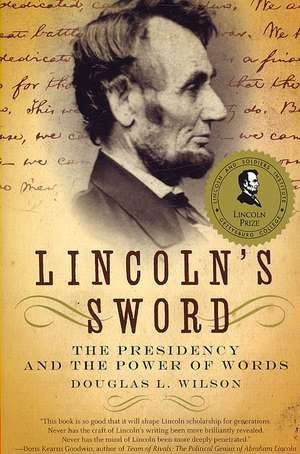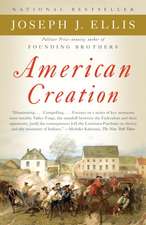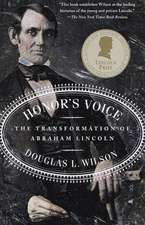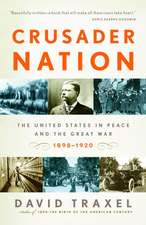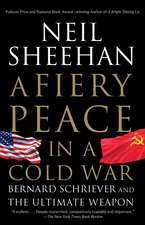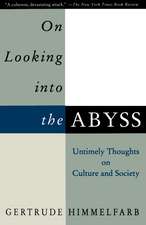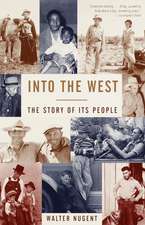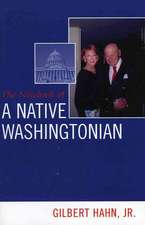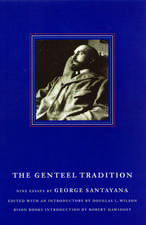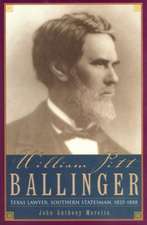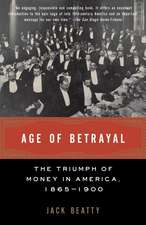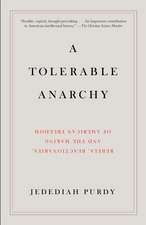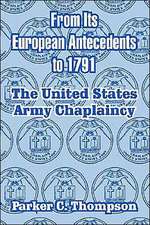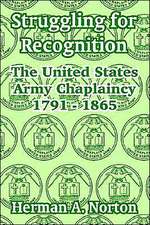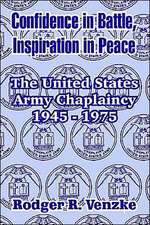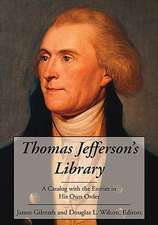Lincoln's Sword: The Presidency and the Power of Words
Autor Douglas L. Wilsonen Limba Engleză Paperback – 30 sep 2007
Preț: 116.47 lei
Nou
Puncte Express: 175
Preț estimativ în valută:
22.29€ • 23.18$ • 18.65£
22.29€ • 23.18$ • 18.65£
Carte disponibilă
Livrare economică 21 februarie-07 martie
Preluare comenzi: 021 569.72.76
Specificații
ISBN-13: 9781400032631
ISBN-10: 1400032636
Pagini: 343
Ilustrații: 50 ILLUSTRATIONS
Dimensiuni: 135 x 203 x 18 mm
Greutate: 0.34 kg
Editura: Vintage Books USA
ISBN-10: 1400032636
Pagini: 343
Ilustrații: 50 ILLUSTRATIONS
Dimensiuni: 135 x 203 x 18 mm
Greutate: 0.34 kg
Editura: Vintage Books USA
Notă biografică
Douglas L. Wilson, co-director, with Rodney O. Davis, of the Lincoln Studies Center at Knox College, is the author Lincoln before Washington: New Perspectives on the Illinois Years (University of Illinois Press, 1997); Herndon's Informants: Letters and Interviews about Abraham Lincoln (edited with Rodney O. Davis, University of Illinois Press, 1998); and Honor's Voice: The Transformation of Abraham Lincoln (Alfred A. Knopf, 1998), which was awarded the Lincoln Prize for 1999, and Herndon's Lincoln (edited with Rodney O. Davis, University of Illinois Press, 2006). The Lincoln Studies Center is currently retained by the Library of Congress to transcribe and annotate documents in its Lincoln Papers for the World Wide Web. He lives in Galesburg, Illinois, Abraham Lincoln's hometown.
Extras
Chapter One
Springfield Farewell
On the day before his fifty-second birthday, February 11, 1861, President-elect Abraham Lincoln boarded a train in Springfield, Illinois, and set off for Washington. Before leaving his hometown, he had said a series of good-byes. Ten days earlier he had paid an emotional visit to his aged stepmother and visited the grave of his father. He had hosted a public reception, personally greeting the hundreds of well-wishers who streamed into and out of his house at Eighth and Jackson. The day before, he had made a final, nostalgic visit to his law office and his law partner of sixteen years, William H. Herndon. Inside the Great Western Railway station, just prior to his train’s departure, he gravely shook hands with the loyal contingent of close friends who had braved an early morning hour and drizzling rain to see him off. Ordinarily a man of remarkable self-control, Lincoln was unable to disguise his feelings. As he shook hands with his friends, according to a reporter on the scene, “his face was pale and quivered with emotion so deep as to render him almost unable to utter a single word.”
Lincoln’s rare display of emotion must have been evident to the larger crowd of well-wishers waiting outside the station. They had gathered in the street, between the station and the “stub,” or sidetrack, into which the special train was backed for boarding, and Lincoln and his party had to pass through them to reach the train. “As Mr. Lincoln mounted the platform of the car,” observed another reporter, many in the crowd seemed “deeply affected, and he himself scarcely able to check the emotions of the hour.” The night before, he had told the reporters traveling with him that he would make no remarks at the station, but once inside the car, he changed his mind. He returned to the platform at the rear of the car and removed his hat. The crowd grew silent, and the men in the crowd responded by removing theirs. An old friend who was present, James C. Conkling, wrote the next day to his son: “It was quite affecting. Many eyes were filled to overflowing as Mr. Lincoln uttered those few and simple words which you will see in the papers. His own breast heaved with emotion and he could scarcely command his feelings sufficiently to commence.”
Different versions of Lincoln’s “few and simple words” were reported in newspapers, but in 1887, his former secretaries, John G. Nicolay and John Hay, published an authoritative text of the speech, which they transcribed from a manuscript in Lincoln’s own hand (see Fig. 1-1):
My friends—No one, not in my situation, can appreciate my feeling of sadness at this parting. To this place, and the kindness of these people, I owe every thing. Here I have lived a quarter of a century, and have passed from a young to an old man. Here my children have been born, and one is buried. I now leave, not knowing when, or whether ever, I may return, with a task before me greater than that which rested upon Washington. Without the assistance of that Divine Being, who ever attended him, I cannot succeed. With that assistance I cannot fail. Trusting in Him, who can go with me, and remain with you and be every where for good, let us confidently hope that all will yet be well. To His care commending you, as I hope in your prayers you will commend me, I bid you an affectionate farewell.
This handwritten text confirmed the judgment of the original Springfield audience that his farewell had been a very poignant and affecting speech. As many commentators have pointed out, these nine sentences admirably display Lincoln’s talent for conciseness, for weaving together appropriate words and rhythms, and for saying ordinary things in an extraordinary and memorable way. This text is duly reported in all modern biographies and has been inscribed in stone at the Illinois State Capitol. But these words are not the ones he uttered at the railway station in 1861.
What Lincoln actually said on that occasion is difficult to determine with any degree of precision, for the contemporary accounts vary. What is clear from abundant testimony, and from the evidence of the manuscript itself, is that he wrote out this text not before the speech, but afterward, on the train. That his manuscript text is not an exact replication of the words he had spoken on the platform can be shown by a close comparison of the various accounts, but it is also evident from the many eyewitness reports of the dramatic climax of the occasion. The New York Herald reporter Henry Villard, who had been in Springfield covering the president-elect closely for six weeks, wrote in his report: “Towards the conclusion of his remarks himself and audience were moved to tears. His exhortation to pray elicited choked exclamations of ‘We will do it; we will do it.’ ” The dispatch that was most widely printed and whose text is probably the closest to what Lincoln said also noted the visible emotion in the audience and recorded a similar response: “Loud applause and cries of ‘We will pray for you.’ ” This spontaneous emotional exchange between Lincoln and the crowd seems to have escaped the notice of most of his biographers, but it is, in fact, clearly evident in all the on-the-scene accounts.
According to Lincoln’s hometown paper, this touching moment was marked by his appealing to the crowd “with the earnestness of a sudden inspiration of feeling.” The report that would seem to be the nearest approximation of Lincoln’s spoken words renders the passage this way:
He [Washington] never would have succeeded except for the aid of Divine Providence, upon which he at all times relied. I feel that I cannot succeed without the same Divine aid which sustained him, and on the same Almighty Being I place my reliance for support, and I hope you, my friends, will all pray that I may receive that Divine assistance . . .
It was doubtless at this point that the crowd, responding to his emotional plea, began to erupt with cries of “We will pray for you” or “We will do it,” even before the conclusion of the sentence:
. . . without which I cannot succeed, but with which success is certain.
In his manuscript text, this earnest appeal for the prayers of his audience is present but deliberately muted and unobtrusively folded into the final sentence: “To His care commending you, as I hope in your prayers you will commend me, I bid you an affectionate farewell.” This raises an obvious question: why did Lincoln, in writing out a revised version of his speech, play down its most electrifying moment so that it virtually disappeared from view? One possibility is that he had second thoughts about how it would look to have his first public utterance as president-elect be a plea for prayers. Indeed, J. G. Holland recalled in his 1866 biography that there had been just such public comment at the time. But why Lincoln effectively suppressed what had been the most affecting part of his speech when he came to write it out is surely best understood not in terms of message but of medium.
Lincoln knew from long experience that addressing a live audience is very different from addressing readers on the page. A speaker before an audience has special tools at his command—body language, gestures, facial expressions, volume and tone of voice, pace, and so on. Because he has direct contact with his audience, a speaker can gauge its mood and receptiveness and can take immediate advantage of its reactions. The writer must rely on other devices, and a seasoned practitioner of both forms of expression like Lincoln could be expected to adapt his text accordingly. In speaking to the crowd at the train station, for example, he could sense the emotion of the audience rising to meet his own and spontaneously put in an appeal for their prayers. But in an address for the consumption of silent and invisible readers, who were not in the grips of an emotional leave-taking, the situation would be very different. The appeal therefore had to take a different form.
What is of interest here is that Lincoln’s manuscript text is not a reiteration of his speech, but a revision. Asked by Villard to write out his remarks after the speech, Lincoln knew instinctively that what he had said extemporaneously would have to be reshaped and reconstituted to work as well for readers as it had for those present at the send-off. And because he was a seasoned practitioner in the art of revision, this was a clear opportunity to improve upon what he had said. Looking at some of the differences between the spoken and the written versions affords an opportunity to see the results of this process. Take, for example, the sentence from the spoken version “To this people I owe all that I am.” In its revised form, this became “To this place, and the kindness of these people, I owe everything.” One of the most discerning admirers of Lincoln’s writing, the historian Jacques Barzun, has called attention to this sentence in making the case that the key to “Lincoln’s extraordinary power” as a writer was his ability “to make his spirit felt.” Lincoln’s writing, Barzun argues, tends to reflect a complicated sense of himself in relation to his audience. In his typical self-deprecating way, he often managed to create an “emotional distance” between himself and his audience that he used to advantage in his speeches and writings. Nowhere is this clearer, according to Barzun, than in the second sentence of the Farewell Address. “If we stop to think, we ask: ‘This place’?—yes. But why ‘these people’? Why not ‘you people,’ whom he was addressing from the train platform, or ‘this place and the kindness of its people’? . . . ‘These’ is a stroke of genius,” Barzun says, because it has “Lincoln talking to himself about the place and the people whom he was leaving, foreboding the possibility of his never returning.” The linchpin of Barzun’s observation—the word “these”—was not, of course, in the reports of the spoken address but appears only in Lincoln’s written revision.
Another good example is the passage considered earlier, which the likeliest report of the speech as actually spoken renders like this:
I feel that I cannot succeed without the same Divine aid which sustained him, and on the same Almighty Being I place my reliance for support, and I hope you, my friends, will all pray that I may receive that Divine assistance without which I cannot succeed, but with which success is certain.
With the plea for prayer removed, this becomes in revision
Without the assistance of that Divine Being, who ever attended him, I cannot succeed. With that assistance I cannot fail.
Here Lincoln has seized the necessity for recasting his plea for the prayers of his audience to refine and bring out the latent rhetorical antithesis in the passage. In fact, as we shall see, a special talent for antithesis, the balanced opposition of words or phrases, would stamp nearly all of Lincoln’s greatest writings as president.
Another example of how Lincoln improved his text in revising his speech for general readers, as opposed to local listeners, is a subtle change to the treatment of his life in Springfield. The report that seems closest to what he actually said on the platform has one notable omission, an element that appears in all other accounts. This is the reference to growing from a young to an old man. For purposes of comparing the spoken with the written versions, this element has been inserted in brackets.
Here I have lived more than a quarter of a century [and have passed from a young to an old man]; here my children were born, and here one of them lies buried.
This is an effective passage whose appeal depends on a parallelism of clauses and the cadenced repetition of the word “here.” But in the revision, the modification, though not great, results in a significantly different feel.
Here I have been a quarter of a century, and have passed from a young to an old man. Here my children have been born, and one is buried.
There are a number of changes in this passage that are worthy of comment, but here it will suffice to point out but one, the change from “Here I have lived” to “Here I have been." Because Lincoln’s train-shaken handwriting was so difficult to decipher (see Fig. 1-2), his secretaries failed to note this change, which does not seem to have been detected until recently.
Nonetheless, it is confirmed by the text printed the next day in the New York Herald, which Villard says came from a copy Lincoln gave him. The speaker on the platform who spoke the word “lived” almost certainly did not know that he would shortly use the words “born” and “buried,” much less that, taken together, they would poignantly sum up a full range of life experiences. But the writer on the train did know it. The word he substituted, “been,” clearly anticipates the words “born” and “buried” and forms an alliterative bond with them, but it also gives a different sense of the speaker. It conveys a certain rootedness and has a subtle resonance of its own.
The comparison with George Washington, the most revered figure in American history, as a way of calling attention to the difficulty he faced, was bold to the point of presumption. In the largest chamber of the Illinois State Capitol, which was regularly used for public events and where Lincoln had frequently appeared, the speaker stood directly under a large, looming portrait of the first president, an image that was probably summoned to mind by his Springfield listeners at the railway station. In calling attention to his mission of somehow preserving what Washington had established, Lincoln managed to conjure up, without having to name them, a cluster of deep-rooted patriotic meanings, such as loyalty, service, dedication, and sacrifice.
As originally uttered, the comparison with Washington was effectively introduced:
I know not how soon I shall see you again. A duty devolves upon me which is, perhaps, greater than that which has devolved upon any other man since the days of Washington.
Spoken by a fellow townsman taking his leave, the first sentence must have been quite affecting, but given the slightly stilted and self-conscious character of its expression, its appeal on the page to strangers would likely be much less. Better to begin on a stronger note and meld the messages of the two sentences (thirty-three words) into one (twenty-four).
I now leave, not knowing when, or whether ever, I may return, with a task before me greater than that which rested upon Washington.
Less, with Lincoln, was often more, as in this case, but as serious writers know only too well, this is much easier said than done. The revised lead-in to the comparison of himself with Washington is a good demonstration that Lincoln knew how it was done.
From the Hardcover edition.
Springfield Farewell
On the day before his fifty-second birthday, February 11, 1861, President-elect Abraham Lincoln boarded a train in Springfield, Illinois, and set off for Washington. Before leaving his hometown, he had said a series of good-byes. Ten days earlier he had paid an emotional visit to his aged stepmother and visited the grave of his father. He had hosted a public reception, personally greeting the hundreds of well-wishers who streamed into and out of his house at Eighth and Jackson. The day before, he had made a final, nostalgic visit to his law office and his law partner of sixteen years, William H. Herndon. Inside the Great Western Railway station, just prior to his train’s departure, he gravely shook hands with the loyal contingent of close friends who had braved an early morning hour and drizzling rain to see him off. Ordinarily a man of remarkable self-control, Lincoln was unable to disguise his feelings. As he shook hands with his friends, according to a reporter on the scene, “his face was pale and quivered with emotion so deep as to render him almost unable to utter a single word.”
Lincoln’s rare display of emotion must have been evident to the larger crowd of well-wishers waiting outside the station. They had gathered in the street, between the station and the “stub,” or sidetrack, into which the special train was backed for boarding, and Lincoln and his party had to pass through them to reach the train. “As Mr. Lincoln mounted the platform of the car,” observed another reporter, many in the crowd seemed “deeply affected, and he himself scarcely able to check the emotions of the hour.” The night before, he had told the reporters traveling with him that he would make no remarks at the station, but once inside the car, he changed his mind. He returned to the platform at the rear of the car and removed his hat. The crowd grew silent, and the men in the crowd responded by removing theirs. An old friend who was present, James C. Conkling, wrote the next day to his son: “It was quite affecting. Many eyes were filled to overflowing as Mr. Lincoln uttered those few and simple words which you will see in the papers. His own breast heaved with emotion and he could scarcely command his feelings sufficiently to commence.”
Different versions of Lincoln’s “few and simple words” were reported in newspapers, but in 1887, his former secretaries, John G. Nicolay and John Hay, published an authoritative text of the speech, which they transcribed from a manuscript in Lincoln’s own hand (see Fig. 1-1):
My friends—No one, not in my situation, can appreciate my feeling of sadness at this parting. To this place, and the kindness of these people, I owe every thing. Here I have lived a quarter of a century, and have passed from a young to an old man. Here my children have been born, and one is buried. I now leave, not knowing when, or whether ever, I may return, with a task before me greater than that which rested upon Washington. Without the assistance of that Divine Being, who ever attended him, I cannot succeed. With that assistance I cannot fail. Trusting in Him, who can go with me, and remain with you and be every where for good, let us confidently hope that all will yet be well. To His care commending you, as I hope in your prayers you will commend me, I bid you an affectionate farewell.
This handwritten text confirmed the judgment of the original Springfield audience that his farewell had been a very poignant and affecting speech. As many commentators have pointed out, these nine sentences admirably display Lincoln’s talent for conciseness, for weaving together appropriate words and rhythms, and for saying ordinary things in an extraordinary and memorable way. This text is duly reported in all modern biographies and has been inscribed in stone at the Illinois State Capitol. But these words are not the ones he uttered at the railway station in 1861.
What Lincoln actually said on that occasion is difficult to determine with any degree of precision, for the contemporary accounts vary. What is clear from abundant testimony, and from the evidence of the manuscript itself, is that he wrote out this text not before the speech, but afterward, on the train. That his manuscript text is not an exact replication of the words he had spoken on the platform can be shown by a close comparison of the various accounts, but it is also evident from the many eyewitness reports of the dramatic climax of the occasion. The New York Herald reporter Henry Villard, who had been in Springfield covering the president-elect closely for six weeks, wrote in his report: “Towards the conclusion of his remarks himself and audience were moved to tears. His exhortation to pray elicited choked exclamations of ‘We will do it; we will do it.’ ” The dispatch that was most widely printed and whose text is probably the closest to what Lincoln said also noted the visible emotion in the audience and recorded a similar response: “Loud applause and cries of ‘We will pray for you.’ ” This spontaneous emotional exchange between Lincoln and the crowd seems to have escaped the notice of most of his biographers, but it is, in fact, clearly evident in all the on-the-scene accounts.
According to Lincoln’s hometown paper, this touching moment was marked by his appealing to the crowd “with the earnestness of a sudden inspiration of feeling.” The report that would seem to be the nearest approximation of Lincoln’s spoken words renders the passage this way:
He [Washington] never would have succeeded except for the aid of Divine Providence, upon which he at all times relied. I feel that I cannot succeed without the same Divine aid which sustained him, and on the same Almighty Being I place my reliance for support, and I hope you, my friends, will all pray that I may receive that Divine assistance . . .
It was doubtless at this point that the crowd, responding to his emotional plea, began to erupt with cries of “We will pray for you” or “We will do it,” even before the conclusion of the sentence:
. . . without which I cannot succeed, but with which success is certain.
In his manuscript text, this earnest appeal for the prayers of his audience is present but deliberately muted and unobtrusively folded into the final sentence: “To His care commending you, as I hope in your prayers you will commend me, I bid you an affectionate farewell.” This raises an obvious question: why did Lincoln, in writing out a revised version of his speech, play down its most electrifying moment so that it virtually disappeared from view? One possibility is that he had second thoughts about how it would look to have his first public utterance as president-elect be a plea for prayers. Indeed, J. G. Holland recalled in his 1866 biography that there had been just such public comment at the time. But why Lincoln effectively suppressed what had been the most affecting part of his speech when he came to write it out is surely best understood not in terms of message but of medium.
Lincoln knew from long experience that addressing a live audience is very different from addressing readers on the page. A speaker before an audience has special tools at his command—body language, gestures, facial expressions, volume and tone of voice, pace, and so on. Because he has direct contact with his audience, a speaker can gauge its mood and receptiveness and can take immediate advantage of its reactions. The writer must rely on other devices, and a seasoned practitioner of both forms of expression like Lincoln could be expected to adapt his text accordingly. In speaking to the crowd at the train station, for example, he could sense the emotion of the audience rising to meet his own and spontaneously put in an appeal for their prayers. But in an address for the consumption of silent and invisible readers, who were not in the grips of an emotional leave-taking, the situation would be very different. The appeal therefore had to take a different form.
What is of interest here is that Lincoln’s manuscript text is not a reiteration of his speech, but a revision. Asked by Villard to write out his remarks after the speech, Lincoln knew instinctively that what he had said extemporaneously would have to be reshaped and reconstituted to work as well for readers as it had for those present at the send-off. And because he was a seasoned practitioner in the art of revision, this was a clear opportunity to improve upon what he had said. Looking at some of the differences between the spoken and the written versions affords an opportunity to see the results of this process. Take, for example, the sentence from the spoken version “To this people I owe all that I am.” In its revised form, this became “To this place, and the kindness of these people, I owe everything.” One of the most discerning admirers of Lincoln’s writing, the historian Jacques Barzun, has called attention to this sentence in making the case that the key to “Lincoln’s extraordinary power” as a writer was his ability “to make his spirit felt.” Lincoln’s writing, Barzun argues, tends to reflect a complicated sense of himself in relation to his audience. In his typical self-deprecating way, he often managed to create an “emotional distance” between himself and his audience that he used to advantage in his speeches and writings. Nowhere is this clearer, according to Barzun, than in the second sentence of the Farewell Address. “If we stop to think, we ask: ‘This place’?—yes. But why ‘these people’? Why not ‘you people,’ whom he was addressing from the train platform, or ‘this place and the kindness of its people’? . . . ‘These’ is a stroke of genius,” Barzun says, because it has “Lincoln talking to himself about the place and the people whom he was leaving, foreboding the possibility of his never returning.” The linchpin of Barzun’s observation—the word “these”—was not, of course, in the reports of the spoken address but appears only in Lincoln’s written revision.
Another good example is the passage considered earlier, which the likeliest report of the speech as actually spoken renders like this:
I feel that I cannot succeed without the same Divine aid which sustained him, and on the same Almighty Being I place my reliance for support, and I hope you, my friends, will all pray that I may receive that Divine assistance without which I cannot succeed, but with which success is certain.
With the plea for prayer removed, this becomes in revision
Without the assistance of that Divine Being, who ever attended him, I cannot succeed. With that assistance I cannot fail.
Here Lincoln has seized the necessity for recasting his plea for the prayers of his audience to refine and bring out the latent rhetorical antithesis in the passage. In fact, as we shall see, a special talent for antithesis, the balanced opposition of words or phrases, would stamp nearly all of Lincoln’s greatest writings as president.
Another example of how Lincoln improved his text in revising his speech for general readers, as opposed to local listeners, is a subtle change to the treatment of his life in Springfield. The report that seems closest to what he actually said on the platform has one notable omission, an element that appears in all other accounts. This is the reference to growing from a young to an old man. For purposes of comparing the spoken with the written versions, this element has been inserted in brackets.
Here I have lived more than a quarter of a century [and have passed from a young to an old man]; here my children were born, and here one of them lies buried.
This is an effective passage whose appeal depends on a parallelism of clauses and the cadenced repetition of the word “here.” But in the revision, the modification, though not great, results in a significantly different feel.
Here I have been a quarter of a century, and have passed from a young to an old man. Here my children have been born, and one is buried.
There are a number of changes in this passage that are worthy of comment, but here it will suffice to point out but one, the change from “Here I have lived” to “Here I have been." Because Lincoln’s train-shaken handwriting was so difficult to decipher (see Fig. 1-2), his secretaries failed to note this change, which does not seem to have been detected until recently.
Nonetheless, it is confirmed by the text printed the next day in the New York Herald, which Villard says came from a copy Lincoln gave him. The speaker on the platform who spoke the word “lived” almost certainly did not know that he would shortly use the words “born” and “buried,” much less that, taken together, they would poignantly sum up a full range of life experiences. But the writer on the train did know it. The word he substituted, “been,” clearly anticipates the words “born” and “buried” and forms an alliterative bond with them, but it also gives a different sense of the speaker. It conveys a certain rootedness and has a subtle resonance of its own.
The comparison with George Washington, the most revered figure in American history, as a way of calling attention to the difficulty he faced, was bold to the point of presumption. In the largest chamber of the Illinois State Capitol, which was regularly used for public events and where Lincoln had frequently appeared, the speaker stood directly under a large, looming portrait of the first president, an image that was probably summoned to mind by his Springfield listeners at the railway station. In calling attention to his mission of somehow preserving what Washington had established, Lincoln managed to conjure up, without having to name them, a cluster of deep-rooted patriotic meanings, such as loyalty, service, dedication, and sacrifice.
As originally uttered, the comparison with Washington was effectively introduced:
I know not how soon I shall see you again. A duty devolves upon me which is, perhaps, greater than that which has devolved upon any other man since the days of Washington.
Spoken by a fellow townsman taking his leave, the first sentence must have been quite affecting, but given the slightly stilted and self-conscious character of its expression, its appeal on the page to strangers would likely be much less. Better to begin on a stronger note and meld the messages of the two sentences (thirty-three words) into one (twenty-four).
I now leave, not knowing when, or whether ever, I may return, with a task before me greater than that which rested upon Washington.
Less, with Lincoln, was often more, as in this case, but as serious writers know only too well, this is much easier said than done. The revised lead-in to the comparison of himself with Washington is a good demonstration that Lincoln knew how it was done.
From the Hardcover edition.
Recenzii
“This book is so good that it will shape Lincoln scholarship for generations. Never has the craft of Lincoln’s writing been more brilliantly revealed. Never has the mind of Lincoln been more deeply penetrated.”
—Doris Kearns Goodwin, author of Team of Rivals: The Political Genius of Abraham Lincoln
“Fascinating. . . an engaging story of how Lincoln used his great intellect and love of the English language to pull the country through its darkest hour. Most books about Lincoln tell the reader why he was a great man; Lincoln's Sword tells how he made himself a great man.”
—Pittsburg Tribune-Review
“The finest book yet produced about Lincoln's uncanny creative process. . . makes a major contribution to scholarship.”
—The New York Sun
“What a delight, what a wonder. . . . For a few hours your faith will be restored in democracy and politics.”
—San Francisco Chronicle
—Doris Kearns Goodwin, author of Team of Rivals: The Political Genius of Abraham Lincoln
“Fascinating. . . an engaging story of how Lincoln used his great intellect and love of the English language to pull the country through its darkest hour. Most books about Lincoln tell the reader why he was a great man; Lincoln's Sword tells how he made himself a great man.”
—Pittsburg Tribune-Review
“The finest book yet produced about Lincoln's uncanny creative process. . . makes a major contribution to scholarship.”
—The New York Sun
“What a delight, what a wonder. . . . For a few hours your faith will be restored in democracy and politics.”
—San Francisco Chronicle
Descriere
This brilliant and unprecedented examination by an acclaimed Lincoln scholar reveals how Lincoln used the power of words to build his political career and to help keep the country united during the Civil War.
